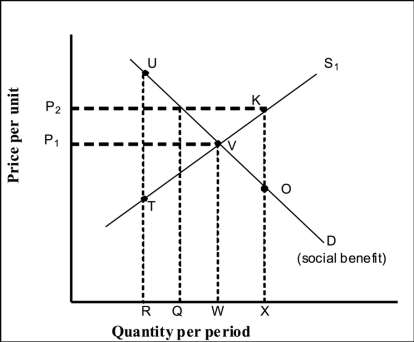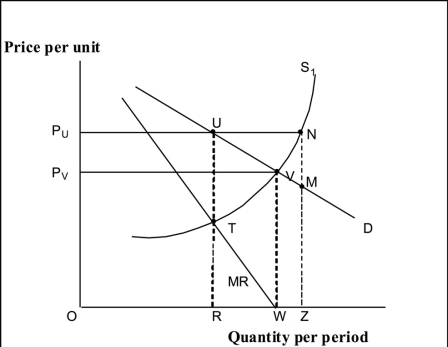Exam 15: Public Finance and Public Choice
Exam 1: Economics: The Study of Choice145 Questions
Exam 2: Confronting Scarcity: Choices in Production198 Questions
Exam 3: Demand and Supply251 Questions
Exam 4: Applications of Supply and Demand113 Questions
Exam 5: Elasticity: a Measure of Response255 Questions
Exam 6: Markets, Maximizers, and Efficiency239 Questions
Exam 7: The Analysis of Consumer Choice244 Questions
Exam 8: Production and Cost227 Questions
Exam 9: Competitive Markets for Goods and Services265 Questions
Exam 10: Monopoly234 Questions
Exam 11: The World of Imperfect Competition237 Questions
Exam 12: Wages and Employment in Perfect Competition189 Questions
Exam 13: Interest Rates and the Markets for Capital and Natural Resources170 Questions
Exam 14: Imperfectly Competitive Markets for Factors of Production183 Questions
Exam 15: Public Finance and Public Choice188 Questions
Exam 16: Antitrust Policy and Business Regulation137 Questions
Exam 17: International Trade186 Questions
Exam 18: The Economics of the Environment148 Questions
Exam 19: Inequality, Poverty, and Discrimination140 Questions
Select questions type
The ability-to-pay principle suggests that the amount of tax a person pays should be greater the greater is a person's income.
(True/False)
4.9/5  (40)
(40)
The vice president of an advertising agency is too busy with an upcoming multi-million-dollar, multimedia margarine campaign to vote in the upcoming tax assessor election.This is an example of:
(Multiple Choice)
4.9/5  (42)
(42)
The evidence in the U.S.economy suggests that, taken collectively, taxes in the economy are:
(Multiple Choice)
4.9/5  (31)
(31)
Although the sales tax is levied proportionately, its incidence turns out to be regressive.
(True/False)
4.8/5  (35)
(35)
Deciding whether the ultimate burden of a tax lies on workers, consumers, or firms is called:
(Multiple Choice)
4.7/5  (41)
(41)
When a government agency buys a good or service, it is called:
(Multiple Choice)
4.9/5  (41)
(41)
The largest transfer payment program in the United States is:
(Multiple Choice)
4.9/5  (34)
(34)
All spending by government agencies is called government purchases.
(True/False)
4.9/5  (39)
(39)
When an action by one agent harms another outside of any market exchange, there is a(n):
(Multiple Choice)
4.9/5  (27)
(27)
A transfer payment for which income is not a qualifying factor is:
(Multiple Choice)
4.8/5  (39)
(39)
Since the 1960s, total government expenditures generally have:
(Multiple Choice)
4.9/5  (39)
(39)
Use the following to answer question(s): Correcting for Market Failure: A Public Good
 -(Exhibit: Correcting for Market Failure: A Public Good) A private market produces R units of output of a public good.By imposing taxes to finance the public good, the government could move the production from R to the efficient level of production of:
-(Exhibit: Correcting for Market Failure: A Public Good) A private market produces R units of output of a public good.By imposing taxes to finance the public good, the government could move the production from R to the efficient level of production of:
(Multiple Choice)
4.9/5  (39)
(39)
If the marginal benefit received from a good is equal to the marginal opportunity cost of production, then:
(Multiple Choice)
4.8/5  (40)
(40)
Paying a tax of $10 on an income of $100, a tax of $25 on an income of $200, and a tax of $60 on an income of $300 is an example of a(n):
(Multiple Choice)
4.7/5  (40)
(40)
Compare and contrast each of the following pairs of economic terms:
a.Ability-to-pay principle versus benefits-received principle
b.Merit and demerit goods
c.Government purchases versus government expenditures
d.Means-tested and non-means-tested transfer payments
e.Progressive tax versus regressive tax
f.Public choice theory and public interest theory analyses of choices in the public sector
(Essay)
4.9/5  (43)
(43)
Use the following to answer question(s): Correcting for Market Failure: Imperfect Competition
 -(Exhibit: Correcting for Market Failure: Imperfect Competition) If the government intervenes to induce the imperfectly competitive firm shown in this exhibit to produce at the efficient level of output of ________ , the change in output would be _______ .
-(Exhibit: Correcting for Market Failure: Imperfect Competition) If the government intervenes to induce the imperfectly competitive firm shown in this exhibit to produce at the efficient level of output of ________ , the change in output would be _______ .
(Multiple Choice)
4.8/5  (35)
(35)
Suppose that in the production of peanut butter, Peanuts 'R' Us discards broken peanut shells onto an adjacent recreational area.This will most likely lead to the market failure of:
(Multiple Choice)
4.7/5  (30)
(30)
According to the text, the growing power of special-interest groups has led to:
(Multiple Choice)
4.9/5  (36)
(36)
Showing 21 - 40 of 188
Filters
- Essay(0)
- Multiple Choice(0)
- Short Answer(0)
- True False(0)
- Matching(0)